It’s such a nuisance when your car gets rough and bouncy while you’re running the engine, and you hear strange noises coming out of it. It’s annoying, unsettling, and you wonder, “Why is my car idling rough, and how do I fix it?”
The most common rough idle causes include a vacuum leak, dirty fuel injectors, a clogged air filter, and dirty oxygen sensors. Occasionally, rough idling can be caused by a misfiring spark plug or ignition coil.
Read on to find out why my car is idling rough and how safe to drive it.
Car Idling Rough Causes

The most common rough idle causes are a vacuum leak, a clogged air filter, dirty fuel injectors, and dirty oxygen sensors. Occasionally, rough idling can be caused by a misfiring spark plug or ignition coil.
What Happens When You’re Idling Your Car?
To better understand what happens when your car is idling rough, you first need to know the basics. When you’re idling your car, the engine should be running even if you don’t step on the accelerator or put it into gear.
When you’re doing this, a good, smooth idling should have a low but steady rate of revolutions, with the tachometer also being steady. It should provide sufficient power to operate your car’s basic systems. These include power steering and electrical systems.
But when your car appears to have trouble maintaining a steady rotation rate, and you feel it idling rough, you know that there is a serious problem. If you start to notice the symptoms, you will need to get your checked out to find and repair the source of the malfunction.
Rough Idle Causes and How to Fix Them
The following are some of the most common rough idle causes and how to fix them:
- Vacuum Leaks
- Dirty Fuel Injectors
- Clogged Air Filter
- Dirty Oxygen Sensor
- Worn Out Spark Plugs
- Clogged Fuel Pump/Fuel Filter
- Carburetor Problems
Let’s discuss each one of them:
1. Vacuum Leaks
Many cars are equipped with various hoses that produce a vacuum seal for the air and the fuel. A throttle controls this to regulate the flow of the air and the engine’s speed. It supplies your car with the air/fuel mixture required to produce combustion. The vacuum is the difference between the air pressure outside and inside the intake manifold.
What Is a Vacuum Leak
In automotive terminology, a vacuum leak means that a certain amount of air has gone off course from the usual engine intake tract, which should not be happening. The engine’s intake air must always follow the route through the throttle body. The mass airflow sensor will measure the air that goes to the engine.
Causes of Vacuum Leaks
A specific amount of air will enter through the intake manifold without passing into the throttle body when a vacuum leak occurs. It will cause the ECU (engine control unit) to inject the necessary amount of fuel solely based on the data it receives from the airflow sensor. This will cause a lean air/fuel mixture that may result in slow acceleration or rough car idling.
Vacuum leaks may transpire if the hoses are cracked or worn out. This can be due to being exposed to extreme temperatures. Leaks may also be caused by a broken rubber tube connected to the intake manifold.
How to Spot a Vacuum Leak
To spot a vacuum leak, inspect the plastic and rubber vacuum hoses for cracks and other signs of damage. Do this while the engine is running. Once you have identified the leak’s source, it should be easy to repair.
How to Fix a Vaccum Leak
Replacing damaged rubber hoses, tube-O rings, valves, and sensors is easy and not very expensive. But it is also possible that the leak is due to faulty brake boosters or a malfunctioning intake manifold gasket. In this case, you’ll need to get it looked at and repaired by a professional.
2. Dirty Fuel Injector
Modern cars have very fuel-efficient engines that utilize high-pressure fuel injectors to spray fuel into the vehicle’s engine. Electronic controlled valves operate said injectors capable of opening and closing several times per second. They can spray the exact amount of fuel into each cylinder at the precise moment.
Prone to Dirt and Contamination
Fuel injectors can perform their task effectively and efficiently. But despite that, they can still be prone to dirt and contamination. Because their spray nozzles have tiny openings, fuel injectors can get dirty or clogged up in the long run. They will supply less fuel to your car when they do, causing it to be idle rough.
Have Your Fuel Injectors Checked
If you haven’t diagnosed the problem yet, visit an auto repair shop where experts use an exhaust gas analyzer. Also, check if you get high readings of hydrocarbon and carbon monoxide. If so, then your fuel injectors are damaged.
How to Fix a Dirty Fuel Injector
If you have already gotten your fuel injectors checked and the problem can be fixed by simple cleaning, a mechanic can clean it using an injectable cleaning concentrate.
You may also clean your fuel injectors using an injector gas additive before any problems develop. Note that gas additives are ideally used as a precautionary measure, but they may or may not keep your car from idling rough.
3. Clogged Air Filter
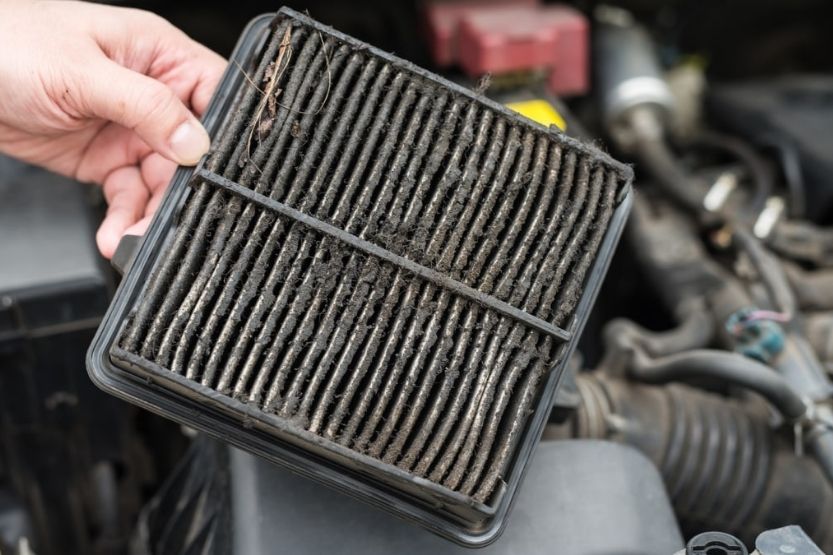
Prevents Dirt from Getting into the Engine
Your car’s air filter is responsible for keeping dirt, dust, and other foreign substances from getting into the engine. Most air filters utilize a folded paper element which can clog up if not regularly changed. So, it is advised that you have your filters replaced at least once a year.
Remember that your car needs just as much air as it does fuel. If the air filter is clogged, it will reduce the airflow into the engine, which can cause rough car idling. It can also cause poor fuel economy.
How to Fix Clogged Air Filter
You will have to remove the clogged air filter and replace it with a new one. And while you’re at it, you should also clean off any buildup of dirt from the filter housing.
Again, what are the causes of car rough idling? Some of the causes of a rough idling engine include faulty spark plugs or wires, which cause uneven fuel burning. When the damage is severe, your engine might run rough while traveling.
4. Dirty Oxygen Sensor
Measures the Richness or Leanness of Gases
A dirty oxygen sensor can cause a car to idle rough. Its function is to measure the richness or leanness of gases exiting the combustion chamber. The car computer adjusts the fuel entering the engine based on the data.
If the oxygen sensor is dirty or faulty, it can send inaccurate data to the computer. It then causes the engine to run lean or run rich. This can lead a car to idle rough.
Symptoms of a Dirty Oxygen Sensor
If the check engine light turns on, your oxygen sensor needs cleaning. You can also use your OBD-II scanner to check the trouble codes. Find out if your sensor needs to be cleaned.
How to Clean Dirty Oxygen Sensor
When cleaning your oxygen sensor, use a commercial product for emission system cleaning. Apply it as per the instructions. Do not use non-automotive cleaning products or solvents.
5. Worn Out Spark Plugs
Produce Spark That Causes Air/Fuel Mixture to Ignite
Another potential reason your car is idling rough is that your car has worn-out spark plugs. Assisted by the ignition coil, which generates high voltage, the spark plugs produce a spark that causes each engine’s cylinder’s air/fuel mixture to ignite.
Faulty Due to Buildup of Dirt and Oil
Over time, the buildup of dirt and oil from the combustion process will cause spark plugs to become faulty. This decreases the amount of power they generate during ignition.
Change Spark Plugs Every 30,000-50,000 Miles
Regular spark plugs require to be changed every 30,000-50,000 miles. If they aren’t changed on schedule, it will result in worn-out electrodes. This will create a larger gap that needs more power to operate. This could damage other components and lead to rough idling and other engine-related issues.
How to Fix Worn Out Spark Plugs
To fix the problem, remove the spark plug and check its condition to find out why it is causing your car to idle rough. If you spot carbon deposits, your spark plug isn’t strong enough.
If there are oil deposits, this could either mean that the piston rings are faulty or the valves are leaking. In case you see an ash deposit, this means that either your oil is leaking or maybe you’re using low-quality fuel.
You may also inspect the spark plug wires, as they can cause a rough idle. If the wires are indeed faulty, you should have them replaced.
6. Clogged Fuel Pump or Fuel Filter
Fuel delivery issues can cause a car to idle rough. If the engine isn’t getting enough fuel, it can result in the following:
- Rough idling,
- Sputtering,
- Stalling, and
- Slow acceleration.
The problem can occur due to a clogged or defective fuel pump. This is because it is responsible for pulling the fuel out from the tank and into the fuel injectors. Similarly, if the fuel filter gets clogged, it will be unable to filter foreign matter in the fuel. This will prevent the engine from receiving enough fuel.
How to Fix Clogged Fuel Pump or Fuel Filter
Depending on the severity of the problem, the fuel pump should either be cleaned, repaired, or outright replaced. Likewise, you need to replace clogged fuel filters with new ones.
According to experts, you should regularly replace fuel filters to extend the fuel pump’s life. Consult your owner’s manual for the suggested interval.
7. Carburetor Problems
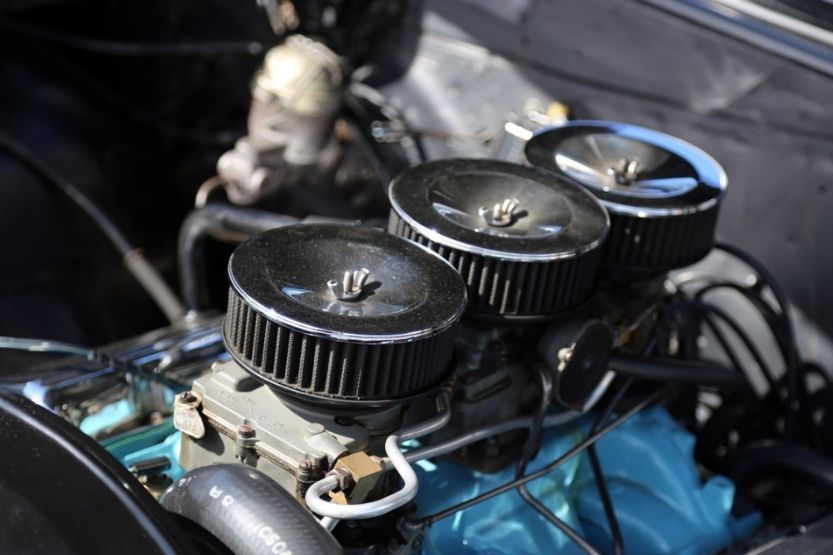
Carburetor Problems Symptoms
Rough idling due to problems with the carburetor is a common issue encountered by older cars with higher mileage. A symptom of having this problem is seeing thick black smoke from the exhaust while running.
Your carburetor shouldn’t be emitting black smoke if it is functioning properly. Seeing it do so is a major warning sign that something is wrong.
How to Fix Carburetor
To fix your carburetor, you need to clean it. Use carburetor cleaner to get rid of carbon buildups and other contaminants. Cleaning your carburetor can help keep your car from idling rough.
You should also check the carburetor choke to see whether or not it fully opened when the engine was warming up. If it is fully open, there might be a few internal issues that may need a carburetor rebuild to repair.
Is It Safe to Drive a Car Idling Rough?
When your car idles rough, it is not in its proper working condition. It is an automotive disorder caused by several issues that need to be dealt with as soon as possible. You may drive a rough idling car.
But do not wait for too long before getting it looked at and fixed. It won’t develop into an even worse problem that will be too costly for you to repair.
There are diagnostic tests that you can do to identify the problem. But you should leave it to a professional mechanic. This is especially true if you do not have the mechanical skill and knowledge to diagnose and repair the problem yourself.
It will also help if you take note of the exact situations where you notice that your car is idling rough. This will help narrow down the possible causes of the problem.
You need to know why your car is idling rough whenever you start or warm up the engine and if you hear strange sounds accompanying it. Try to remember every peculiar thing when they occur.
In Closing
The most common rough idle causes are a vacuum leak, a clogged air filter, dirty fuel injectors, and dirty oxygen sensors. Occasionally, rough idling can be caused by a misfiring spark plug or ignition coil.
A car idling rough isn’t just a serious problem. But it can also be a symptom of a more serious problem within your car.
So, if you’re asking yourself why my car is idling rough, it is an excellent question to ask. When you notice the signs, take heed of them immediately. Allow a mechanic to check your car before it’s too late.
Read next:

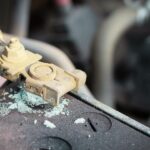
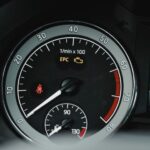

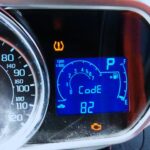
![Check Engine Light On and Off Intermittently [Causes and Fixes] check engine light on and off](https://roadsumo.com/wp-content/uploads/2021/06/check-engine-light-on-and-off-150x150.jpg)
![Gas Leaks in Car [Causes and How to Fix] Gas Leaks in Car](https://roadsumo.com/wp-content/uploads/2021/08/gas-leaks-in-car-150x150.jpg)

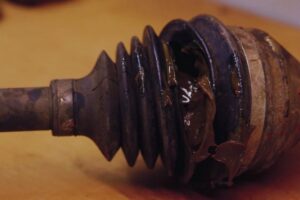
![Read more about the article Charge Pipe [What Is It and Why Use It?]](https://roadsumo.com/wp-content/uploads/2021/06/charge-pipe-300x200.jpg)